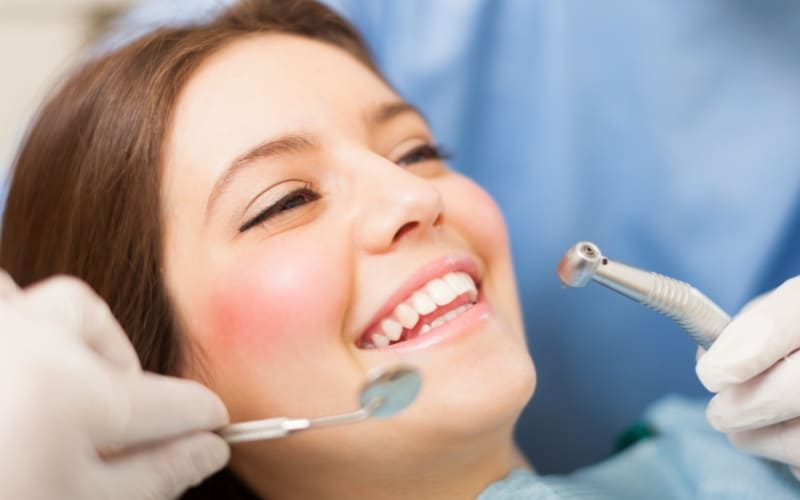Call: (810) 674-3060
How Long Does TMJ Inflammation Take To Heal?

TMJ (Temporomandibular Joint) inflammation involves swelling, discomfort, and limited movement in the jaw joint connecting the skull and jawbone. Causes include jaw injury, teeth grinding, stress, or arthritis, leading to pain, stiffness, clicking sounds, and difficulty opening or closing the mouth. Inflammation can result from cartilage wear, muscle tension, or joint misalignment.
Treatments encompass self-care (ice packs, soft diet, stress reduction), medications (pain relievers, muscle relaxants), oral devices, physical therapy, and, in severe cases, surgery.
Timely diagnosis and management alleviate symptoms and prevent long-term complications, enhancing jaw functionality and comfort. Regular dental check-ups aid in early detection and treatment.
Causes and Symptoms
Causes of TMJ Inflammation:
1. Jaw Trauma or Injury: Physical impact, accidents, or direct trauma to the jaw can lead to TMJ inflammation.
2. Teeth Grinding or Clenching: Habitual teeth grinding (bruxism) or clenching, often due to stress or anxiety, can strain the jaw muscles and contribute to TMJ issues.
3. Arthritis: Conditions like rheumatoid arthritis or osteoarthritis can affect the TMJ, causing inflammation and discomfort.
4. Joint Misalignment: An improper jaw joint alignment can lead to irregular movement, wear down the joint, and subsequently cause inflammation.
5. Stress: Emotional or psychological stress can result in jaw muscle tension, leading to TMJ problems.
Also Read: What Are the Main Causes Of TMJ?
Symptoms of TMJ inflammation:
1. Pain: Discomfort or tenderness in the jaw joint area, which may spread to the face, neck, or shoulders.
2. Limited Jaw Movement: Difficulty or pain while chewing, speaking, or opening the mouth wide.
3. Clicking or Popping Sounds: Audible noises such as clicking, popping, or grating when moving the jaw.
4. Locking of the Jaw: In severe cases, the jaw may lock, making it challenging to open or close the mouth thoroughly.
5. Headaches or Earaches: TMJ issues can cause headaches, ear pain, or a sensation of pressure in the ears due to their proximity to the jaw joint.
The Healing Process of TMJ Inflammation
1. Diagnosis and Assessment: Proper diagnosis by a healthcare professional, often a dentist or an oral surgeon, is crucial. They may conduct physical exams and imaging tests (like X-rays or MRIs) and review medical history to determine the extent of inflammation.
2. Symptom Management: Initial treatment focuses on alleviating symptoms. This may involve using ice packs, applying heat, avoiding hard/chewy foods, and practicing relaxation techniques to reduce muscle tension.
3. Medications: Pain relievers, anti-inflammatories, muscle relaxants, or corticosteroid injections may be prescribed to reduce pain and inflammation.
4. Oral Appliances: Custom mouthguards or splints can help realign the jaw, prevent teeth grinding, and reduce pressure on the TMJ.
5. Physical Therapy: Exercises to strengthen jaw muscles, improve range of motion, and correct posture can aid in healing and preventing future inflammation.
The healing timeline varies for each individual. Mild cases might improve within weeks to months with conservative treatments, while more severe cases or those requiring surgery might involve more extended recovery periods.
Factors That Affect the Healing Time
1. Severity of Inflammation: The extent of TMJ inflammation plays a significant role. Mild cases resolve quicker than severe or chronic inflammation, which requires prolonged treatment and recovery.
2. Underlying Cause: Identifying and addressing the root cause, such as trauma, arthritis, or chronic teeth grinding, impacts healing. Resolving or managing the primary issue aids in faster recovery.
3. Individual Response to Treatment: Each person’s body reacts differently to treatments. Some individuals might respond well to conservative methods like medications, physical therapy, or oral appliances, leading to faster improvement, while others might take longer to respond.
4. Compliance with Treatment: Adherence to recommended therapies, exercises, or lifestyle changes significantly affects healing. Consistently following the healthcare provider’s advice speeds up recovery and prevents setbacks.
5. Presence of Concurrent Conditions: Other health conditions or factors like stress, autoimmune disorders, or dental issues can influence the healing process. Managing these conditions concurrently may impact the rate of TMJ inflammation resolution.
Factors such as overall health, age, and comorbidities also contribute to the healing timeline.
Treatment Options for TMJ Inflammation
1. Self-Care Measures: Incorporating self-care practices helps manage TMJ inflammation. This includes applying ice packs or moist heat to the affected area, eating soft foods, avoiding extreme jaw movements, practicing relaxation techniques, and maintaining good posture.
2. Medications: Over-the-counter pain relievers like ibuprofen or acetaminophen can help alleviate pain and reduce inflammation. In some cases, a healthcare professional may prescribe muscle relaxants or prescription-strength anti-inflammatory medications.
3. Oral Appliances: Custom-made oral devices such as mouthguards or splints can be beneficial. These devices help reposition the jaw, prevent teeth grinding (bruxism), and reduce pressure on the TMJ, allowing for healing and relief from discomfort.
4. Physical Therapy: Jaw exercises and physical therapy techniques prescribed by a specialist can strengthen jaw muscles, improve range of motion, and correct posture, thereby reducing TMJ symptoms.
5. Invasive Treatments (in severe cases): For persistent or severe TMJ inflammation that doesn’t respond to conservative treatments, invasive interventions might be considered.
It’s crucial to seek guidance from a healthcare professional, typically a dentist, oral surgeon, or TMJ specialist, who can assess the severity of the condition and recommend appropriate treatment options tailored to the individual’s needs.
In conclusion, effective management of TMJ inflammation involves a multifaceted approach, addressing symptoms and underlying causes. Seeking treatment from Burton Family Dental in Burton ensures access to comprehensive TMJ care.
Individuals can find relief and promote healing through a range of strategies like self-care practices, medications, oral appliances, physical therapy, and, if necessary, invasive treatments.
Burton Family Dental’s expertise in TMJ treatment in Burton provides tailored solutions, emphasizing personalized care and effective interventions for TMJ inflammation, enhancing patients’ comfort and restoring optimal jaw functionality.
Seeking timely evaluation and treatment at Burton Family Dental is pivotal in addressing TMJ concerns and promoting lasting relief. Schedule your TMJ appointment today!




